- Home
- McBain, Ed
87th Precinct 02 - The Mugger
87th Precinct 02 - The Mugger Read online
Table of Contents
Title Page
Copyright
Introduction
Chapter 1
Chapter 2
Chapter 3
Chapter 4
Chapter 5
Chapter 6
Chapter 7
Chapter 8
Chapter 9
Chapter 10
Chapter 11
Chapter 12
Chapter 13
Chapter 14
Chapter 15
Chapter 16
Chapter 17
Chapter 18
Chapter 19
ABOUT THE AUTHOR
Praise for Ed McBain & the 87th Precinct
“Raw and realistic…The bad guys are very bad, and the good guys are better.”—Detroit Free Press
“Ed McBain’s 87th Precinct series…simply the best police procedurals being written in the United States.”—Washington Post
“The best crime writer in the business.”—Houston Post
“Ed McBain is a national treasure.”—Mystery News
“It’s hard to think of anyone better at what he does. In fact, it’s impossible.”—Robert B. Parker
“I never read Ed McBain without the awful thought that I still have a lot to learn. And when you think you’re catching up, he gets better.”
—Tony Hillerman
“McBain is the unquestioned king…light years ahead of anyone else in the field.”—San Diego Union-Tribune
“McBain tells great stories.”—Elmore Leonard
“Pure prose poetry…It is such writers as McBain who bring the great American urban mythology to life.”—The London Times
“The McBain stamp: sharp dialogue and crisp plotting.”
—Miami Herald
“You’ll be engrossed by McBain’s fast, lean prose.”—Chicago Tribune
“McBain redefines the American police novel…he can stop you dead in your tracks with a line of dialogue.”—Cleveland Plain Dealer
“The wit, the pacing, his relish for the drama of human diversity [are] what you remember about McBain novels.”—Philadelphia Inquirer
“McBain is a top pro, at the top of his game.”—Los Angeles Daily News
The Mugger
AN 87TH PRECINCT NOVEL
Ed McBain
The characters and events portrayed in this book are fictitious. Any similarity to real persons, living or dead, is coincidental and not intended by the author.
Text copyright ©1956 Ed McBain
Republished in 2011
All rights reserved.
Printed in the United States of America.
No part of this book may be reproduced, or stored in a retrieval system, or transmitted in any form or by any means, electronic, mechanical, photocopying, recording, or otherwise, without express written permission of the publisher.
Published by Thomas & Mercer
P.O. Box 400818
Las Vegas, NV 89140
eISBN: 9781477855683
The city in these pages is imaginary.
The people, the places are all fictitious.
Only the police routine is based on established
investigatory technique.
INTRODUCTION
Away back in the dim, distant past, a magazine called Manhunt published a story about a former private eye named Matt Cordell, whose gun license had been revoked after he’d pistol-whipped his wife’s lover. Cordell was a drunk living on the Bowery and reluctantly solving cases for old friends who kept popping up to plague his blotto existence. I always thought of him as a defrocked shamus. The pseudonymous editor of Manhunt was someone named “John McCloud” (I know his real name but will not reveal it under threat of extreme torture) who fancied the Matt Cordell stories and bought some half-dozen of them. One of the stories was called “Now Die In It,” a wordplay twist on the expression, “You made your bed, now lie in it.” McCloud—in the trade the banter was, “He wandered lonely as McCloud”—ran the story in 1953. The byline on it was Evan Hunter.
You will be wondering by now what all of this has to do with The Mugger. Well, by the time I sat down to write the second book in the 87th Precinct series, I knew that I wanted to accomplish several things.
1) Cop Hater had used a classic smoke-screen plot as an introduction to the series, with cops the victims of a killer who seemed out to get cops—a way of bringing my full (at the time) complement of cops onstage as both investigators and potential victims. Having set up the characters who would be around, more or less, in every book, I now wanted to experiment with my theory that the squadroom itself could function as a “hero,” with different cops taking the spotlight in each book. Carella, who’d figured largely in the first novel, would be absent this time around—off on his honeymoon, in fact. A patrolman who’d put in a brief appearance in Cop Hater would become involved in a case that he would solve, thereby earning him a promotion and a leap into the squadroom as a rookie detective. To accomplish this, I needed a very strong plot. In fact, in order to elevate the status of the patrolman and keep alive the detectives already introduced in Cop Hater, I needed two strong plots. (Please stay with me; I’m getting there.)
2) The plot involving the detectives would derive from the title The Mugger. (To this day, I will often start a novel with only a title, winging it from there.) The plot involving the patrolman would focus on a murder—it had to be a serious crime in order to earn him his promotion—and it seemed to me that a perfectly serviceable and unusually strong murder plot had been used by me earlier in a story titled (you guessed it) “Now Die In It.”
At the time, I didn’t know if there were any laws about cannibalism, but it seemed to me that many writers before me had expanded short stories into novels or one-act plays into full theater pieces, and anyway I was a firm believer in wasting not, wanting not. Besides, my patrolman (who was Bert Kling, of course) was a far cry from Matt Cordell, who—in the hardboiled private eye tradition of the day—would as soon sock a woman as kiss her. It seemed to me that a new character would give added dimension to a plot I’d already used once. Seeing the same things through Kling’s eyes would make it all seem fresh and different.
As the book turned out, and I didn’t know this when I began writing it, the two plots merged—or seemed to merge. I can’t tell you more about either just now, or I’d spoil both for you. Let me say only that, for me, the combination seemed to work as a unified whole. I hope it still does. And I hope that Matt Cordell, lying in a gutter someplace with a bottle of cheap wine, will forgive me the petty theft.
“He who steals my purse”—but, after all, I didn’t steal his name.
—ED McBAIN
The city could be nothing but a woman, and that’s good because your business is women.
You know her tossed head in the auburn crowns of molting autumn foliage, Riverhead, and the park. You know the ripe curve of her breast where the River Dix molds it with a flashing bolt of blue silk. Her navel winks at you from the harbor in Bethtown, and you have been intimate with the twin loins of Calm’s Point and Majesta. She is a woman, and she is your woman, and in the fall she wears a perfume of mingled wood smoke and carbon dioxide, a musky, musty smell bred of her streets and of her machines and of her people.
You have known her fresh from sleep, clean and uncluttered. You have seen her naked streets, have heard the sullen murmur of the wind in the concrete canyons of Isola, have watched her come awake, alive, alive.
You have seen her dressed for work, and you have seen her dressed for play, and you have seen her sleek and smooth as a jungle panther at night, her coat glistening with the pinpoint jewels of reflected harbor light. You have known her sultry, an
d petulant, and loving and hating, and defiant, and meek, and cruel and unjust, and sweet, and poignant. You know all of her moods and all of her ways.
She is big and sprawling and dirty sometimes, and sometimes she shrieks in pain, and sometimes she moans in ecstasy.
But she could be nothing but a woman, and that’s good because your business is women.
You are a mugger.
Katherine Ellio sat in a hard, wooden chair in the detective squadroom of the 87th Precinct. The early-afternoon sunlight, burnished by autumn, tarnished as a Spanish coin, filtered through the long grilled windows, shadowing her face with a meshed-square pattern.
Her face would not have been a pretty one under any circumstances. The nose was too long, and the eyes were a washed-out brown, arched with brows that needed plucking. The lips were thin and bloodless, and the chin was sharply pointed. It was not pretty at all now, because someone had discolored her right eye and raised a swollen welt along her jawline.
“He came up so very suddenly,” she said. “I really don’t know whether he’d been following me all along or whether he stepped out of an alley. It’s hard to say.”
Detective 3rd/Grade Roger Havilland looked down at the woman from his six-foot height advantage. Havilland owned the body of a wrestler and the face of a Botticelli cherub. He spoke in a loud, heavy voice, not because Miss Ellio was hard of hearing, but simply because Havilland liked to shout.
“Did you hear footsteps?” he shouted.
“I don’t remember.”
“Miss Ellio, try to remember.”
“I am trying.”
“All right, was the street dark?”
“Yes.”
Hal Willis looked at the woman and then at Havilland. Willis was a small detective, barely topping the five-foot-eight minimum height requirement. His deceptive height and bone structure, however, gave no clue to the lethal effectiveness with which he pursued his chosen profession. His sparkling, smiling brown eyes added to the misconception of a happy gnome. Even when he was angry, Willis smiled. He was, at the moment, not angry. He was, to be absolutely truthful, simply bored. He had heard this story, or variations of it, many times before. Twelve times, to be exact.
“Miss Ellio,” he said, “when did this man hit you?”
“After he took my purse.”
“Not before?”
“No.”
“How many times did he hit you?” “Twice.”
“Did he say anything to you?”
“Yes, he…” Miss Ellio’s face contorted with the pain of remembrance. “He said he was only hitting me as a warning. So that I wouldn’t scream for help when he left.”
“What do you think, Rog?” Willis asked. Havilland sighed and then half shrugged, half nodded.
Willis, in pensive agreement, was silent for a moment. Then he asked, “Did he give you his name, Miss Ellio?”
“Yes,” Miss Ellio said. Tears welled up into her inexpressive eyes. “I know this sounds silly. I know you don’t believe me. But it’s true. I didn’t make this up. I…I never had a black eye in my life.”
Havilland sighed.
Willis was suddenly sympathetic. “Now, now, Miss Ellio,” he said, “we believe every word you’ve told us. You’re not the first person who’s come to us with this story, you see. We’re trying to relate the facts of your experience to the facts we already have.” He fished into the breast pocket of his jacket and handed Miss Ellio a handkerchief. “Here now, dry your eyes.”
“Thank you,” Miss Ellio sobbed.
Havilland, bewildered and mystified, blinked at his chivalrous colleague. Willis smiled in his most pleasant A&P clerk manner. Miss Ellio, responding immediately, sniffed, dried her eyes, and began to feel as if she were buying a half pound of onions rather than being interrogated on the activities of a mugger.
“Now then,” Willis said kindly, “when did he give you his name?”
“After he hit me.”
“What did he say?”
“Well, he…he did something first.”
“And what was that?”
“He…I know this sounds silly.”
Willis smiled reassuringly, radiantly. Miss Ellio lifted her face and smiled back girlishly, and Havilland wondered if perhaps they weren’t falling in love.
“Nothing a mugger does sounds silly,” Willis said. “Tell us.”
“He hit me,” Miss Ellio said, “and he warned me, and then he…he bowed from the waist.” She looked up as if expecting shock and surprise to register on the faces of the detectives. She met level, implacable gazes. “He bowed from the waist,” she repeated, as if disappointed with the mild response.
“Yes?” Willis prompted.
“And then he said, ‘Clifford thanks you, madam.’”
“Well, that figures,” Willis said.
“Mmm,” Havilland answered noncommittally.
“Clifford thanks you,” Miss Ellio repeated. “And then he was gone.”
“Did you get any kind of a look at him?” Havilland asked.
“Yes, I did.”
“What did he look like?”
“Well…” Miss Ellio paused, thinking. “He looked just like anybody else.”
Havilland and Willis exchanged patient glances. “Could you be a little more definite?” Willis asked, smiling. “Was he blond? Dark-haired? Red-headed?”
“He was wearing a hat.”
“What color were his eyes?”
“He was wearing sunglasses.”
“The bright night lights blind him,” Havilland said sarcastically. “Either that, or he’s come up with a rare eye disease.”
“Maybe,” Willis said. “Was he clean-shaven? Bearded? Moustached?”
“Yes,” Miss Ellio said.
“Which one?” Havilland asked.
“The man who attacked me,” she said.
“I meant which one of the thr—”
“Oh. Clean-shaven.”
“Long nose or short nose?”
“Well…I guess a medium nose.”
“Thin lips or fat lips?”
“Medium, I guess.”
“Was he short or tall?”
“He was medium height,” Miss Ellio said.
“Fat or thin?”
“Medium,” she said again.
Willis, somehow, was no longer smiling. Miss Ellio regarded his face, and her own smile disintegrated.
“Well, he was,” she said defiantly. “I can’t help it if he didn’t have a big strawberry mark on his cheek or a mole on his nose or anything. Listen, I didn’t ask for him to be an average person. I didn’t ask for him to steal my purse, either. There was a lot of money in that bag.”
“Well,” Havilland shouted, “we’ll do what we can to apprehend him. We have your name and address, Miss Ellio, and if anything comes up, we’ll notify you. Do you think you’d be able to make a positive identification if you saw the man again?”
“Definitely,” Miss Ellio said. “He took a lot of money from me. There was a lot of money in that purse.”
Willis bit. “How much, exactly, was in the purse?” he asked.
“Nine dollars and seventy-two cents,” Miss Ellio answered.
“Plus a fortune in rare gems,” Havilland added in one of his choicer attempts at wit.
“What?” Miss Ellio said.
“We’ll call you,” Havilland answered, and he took her elbow and escorted her to the slatted railing that divided the squadroom from the corridor. When he got back to the desk, Willis was doodling on a sheet of paper.
“What do you make of Miss Ellio?” Willis asked.
“I think she invented the story.”
“Come on, Rog.”
“I think she’s been reading in the newspapers about the mugger named Clifford. I think she’s an old maid who lives in a two-room apartment. I think she looks under the bed every night and finds nothing but the chamber pot. I think she tripped over the chamber pot last night, bruised herself, and decided to make a
bid for a little excitement.” Havilland caught his breath. “I also think you and her would make a good couple. Why don’t you ask her to marry you?”
“You’re very comical on Tuesdays,” Willis said. “You don’t believe she was mugged?”
“The sunglasses part was a stroke of real genius! The lengths people will go to when they’re lying.”
“He may have been wearing sunglasses,” Willis said.
“Sure. And Bermuda shorts, too. Like I said, he’s suddenly contracted pink eye.” Havilland snorted. “‘Clifford thanks you, madam.’ Straight out of the papers. There ain’t a citizen of this city who hasn’t heard about Cliff the Mugger and his punch in the mouth and his bow from the waist.”
“I think she was telling the truth,” Willis said.
“Then you type up the report,” Havilland answered. “Just between you and me, Cliff’s beginning to give me a big pain in the behind.”
Willis stared at Havilland.
“What’s the matter?” Havilland shouted.
“When’s the last time you typed up a report?”
“Who wants to know?”
“I do,” Willis said.
“When did you become police commissioner?”
“I don’t like the way you goof off,” Willis answered. He wheeled over the typing cart, opened the desk drawer, and took out three sheets of the DD report form.
“Everybody else is goofing off, ain’t they?” Havilland asked. “What’s Carella doing if he’s not goofing off?”
“He’s on his honeymoon, for Pete’s sake,” Willis said.

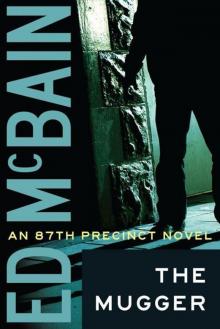 87th Precinct 02 - The Mugger
87th Precinct 02 - The Mugger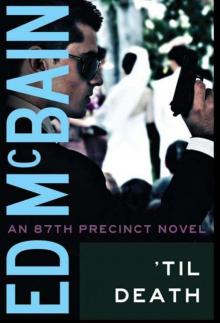 87th Precinct 09 - Til Death
87th Precinct 09 - Til Death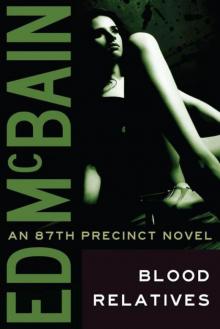 Blood Relatives (87th Precinct)
Blood Relatives (87th Precinct) Killer's Payoff
Killer's Payoff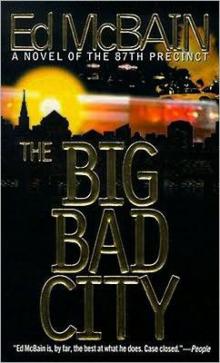 The Big Bad City
The Big Bad City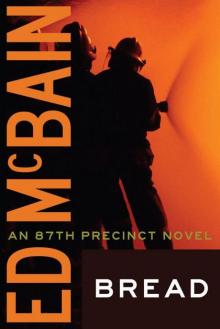 Bread (87th Precinct)
Bread (87th Precinct)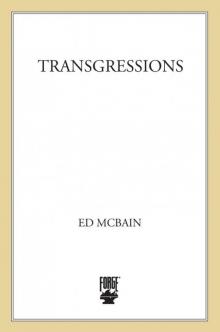 Transgressions Vol. 3
Transgressions Vol. 3 Runaway
Runaway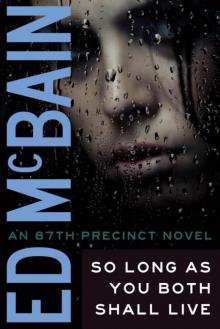 So Long As You Both Shall Live (87th Precinct)
So Long As You Both Shall Live (87th Precinct)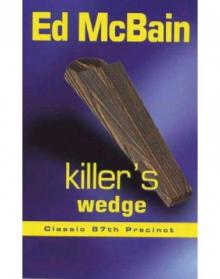 Killer's Wedge
Killer's Wedge